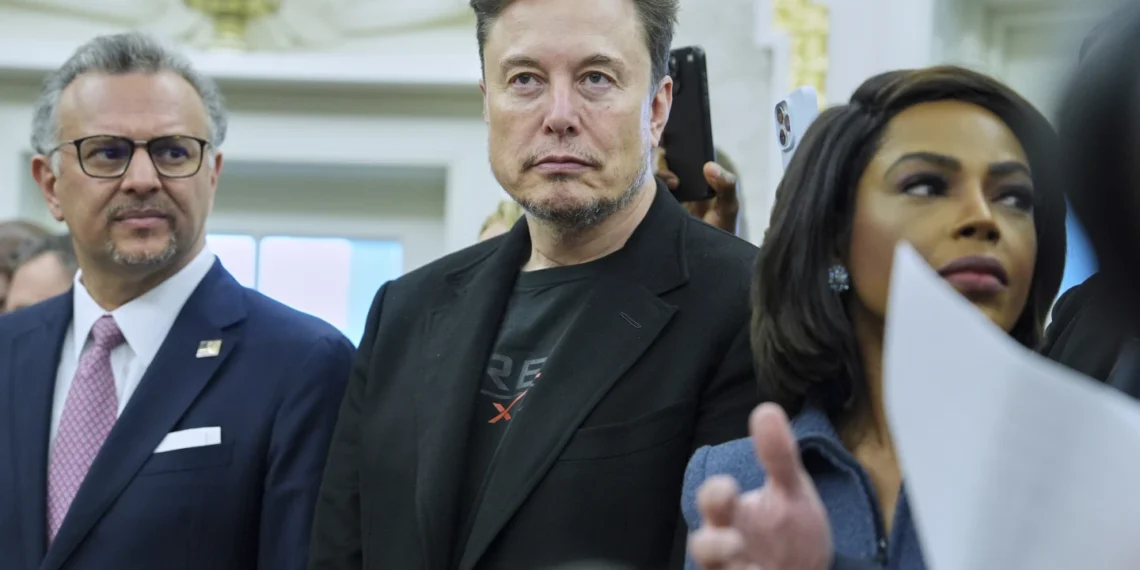Elon Musk Exits Trump Administration After Leading Effort to Slash Federal Spending
WASHINGTON – Elon Musk is stepping down from his role as a top adviser to President Donald Trump, ending a turbulent stint marked by an ambitious push to cut federal government spending and overhaul bureaucracy.
Musk, the billionaire entrepreneur behind Tesla and SpaceX, led the Department of Government Efficiency (nicknamed DOGE) — a special government unit focused on rooting out waste and streamlining agencies. But despite his high-profile efforts, Musk struggled to navigate Washington’s complex political landscape and faced strong resistance from both politicians and bureaucrats.
From $2 Trillion to $150 Billion: Musk’s Spending Cut Goals Shrink
Originally aiming to slash $2 trillion from the federal budget, Musk had to dramatically scale back his target, eventually settling on $150 billion. Frustrated by roadblocks and political blowback, he frequently clashed with other Trump officials who resisted his shake-up plans.
His departure was announced suddenly via a post on X (formerly Twitter), where Musk wrote:
“As my scheduled time as a Special Government Employee comes to an end, I would like to thank President @realDonaldTrump for the opportunity to reduce wasteful spending. The @DOGE mission will only strengthen over time as it becomes a way of life throughout the government.”
A White House official confirmed the move but didn’t provide further details on the timing.
Political Pushback and Mixed Reactions to Trump’s Spending Bill
Musk’s exit came just a day after he openly criticized a major piece of Trump’s legislative agenda—a large tax and immigration bill the president has dubbed the “big beautiful bill.” Musk called the legislation a “massive spending bill” that increases the deficit and undermines his department’s efforts.
“I think a bill can be big or it could be beautiful, but I don’t know if it could be both,” Musk told CBS News.
Trump responded from the Oval Office, acknowledging the bill’s political compromises:
“I’m not happy about certain aspects of it, but I’m thrilled by other aspects of it. We’re going to see what happens. It’s got a way to go.”
Republicans recently passed the bill in the House, and it’s currently under debate in the Senate. Some GOP lawmakers share Musk’s concerns. Wisconsin Sen. Ron Johnson said he sympathizes with Musk’s discouragement and expects the bill’s progress to slow unless leadership gets serious about spending cuts.
Meanwhile, House Speaker Mike Johnson urged senators to avoid major changes, emphasizing that the House’s version reflects a “very delicate balance.” He also thanked Musk for his work and promised more efforts to cut spending, saying “the House is eager and ready to act on DOGE’s findings.”
The Legacy of DOGE and Ongoing Spending Battles
The White House plans to send proposed rescissions—essentially budget cancellations—to Congress, including $1.1 billion from public broadcasting (which funds NPR and PBS) and $8.3 billion in foreign aid, to lock in some of DOGE’s cuts.
Musk’s experience in government left him somewhat chastened. In an interview with The Washington Post, he admitted the federal bureaucracy is far worse than he expected and called improving it an “uphill battle.”
He also hinted he’s dialing back his political involvement: “I think I’ve done enough.”
From Trump Booster to Frustrated Reformer
Musk entered the Trump orbit energized, donating at least $250 million to the campaign and enthusiastically supporting the president. He even held campaign rallies and publicly praised Trump, saying in February, “The more I’ve gotten to know President Trump, the more I like the guy. Frankly, I love him.”
Trump, in turn, lauded Musk as “a truly great American” and supported Tesla when its sales slipped, even using the White House driveway as a Tesla showroom.
What’s Next? The Future of Spending Cuts Without Musk
Though Musk is leaving, his critiques could fuel opposition to the spending bill among Republicans. Senator Mike Lee of Utah reposted Musk’s interview and vowed a tougher Senate version:
“The Senate version will be more aggressive. It can, it must, and it will be. Or it won’t pass.”
Only two House Republicans voted against the bill, but some, like Rep. Warren Davidson, hope the Senate can do better:
“Hopefully, the Senate will succeed with the Big Beautiful Bill where the House missed the moment.”
The Numbers Behind the Bill
The Congressional Budget Office estimates the tax changes will add $3.8 trillion to deficits over 10 years, while cuts to programs like Medicaid and food stamps will reduce spending by just over $1 trillion in the same period.
House GOP leaders argue that economic growth spurred by the bill will balance the budget, but watchdog groups are skeptical. The Committee for a Responsible Federal Budget projects the bill would add $3 trillion to the national debt, including interest, over the next decade.
Bottom Line
Elon Musk’s brief but headline-grabbing role in the Trump administration showed the challenge of shaking up government spending in Washington. Despite his star power and bold ambitions, entrenched political realities and fierce opposition ultimately limited his impact. Now, as he steps away, the battle over the nation’s budget continues — with or without the billionaire’s direct involvement.
This article was rewritten by JournosNews.com based on verified reporting from trusted sources. The content has been independently reviewed, fact-checked, and edited for accuracy, neutrality, tone, and global readability in accordance with Google News and AdSense standards.
All opinions, quotes, or statements from contributors, experts, or sourced organizations do not necessarily reflect the views of JournosNews.com. JournosNews.com maintains full editorial independence from any external funders, sponsors, or organizations.
Stay informed with JournosNews.com — your trusted source for verified global reporting and in-depth analysis. Follow us on Google News, BlueSky, and X for real-time updates.














